You see, dogs are experts at finding hidden treasures, but they’re not so good at finding dental floss. That’s where you come in as a responsible pet owner. And ask yourself how often should you brush a dog’s teeth?
Now, before you start picturing your dog reclining in a dental chair with tiny sunglasses on, let’s talk about how often you should tackle on this grand dental adventure.
We’ll break it down for you in a way that even your dog would understand, although they’d probably just be hoping for a treat
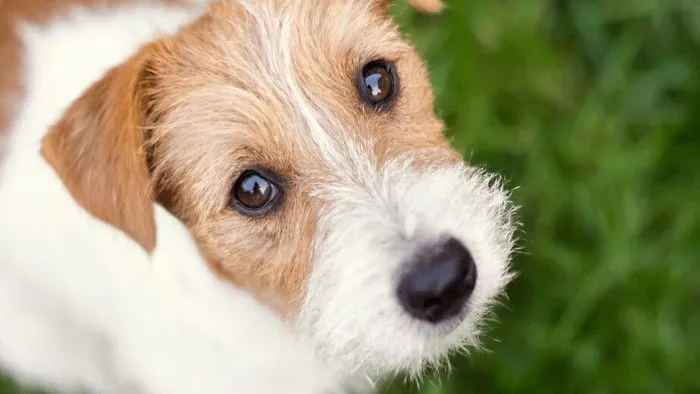
How Often Should You Brush a Dog’s Teeth?
Brushing your dog’s teeth is an essential part of maintaining their overall health and well-being. The frequency of brushing your dog’s teeth can vary depending on their individual needs, temperament, and the level of dental care they require.
Regardless of the desired frequency, always use dog-specific toothpaste and brushes, introduce brushing gradually, and consult with a vet for guidance:
Daily Brushing
Daily brushing is considered the gold standard of dental care for dogs and is ideal for most dogs. This frequency ensures the most effective removal of plaque and food particles, reducing the risk of dental issues.
Daily brushing helps prevent the build-up of plaque, which can lead to tartar formation and gum disease[1]. Regular brushing keeps your dog’s breath fresher, making cuddle time more pleasant. Good dental hygiene is linked to better overall health, as dental problems can impact vital organs.
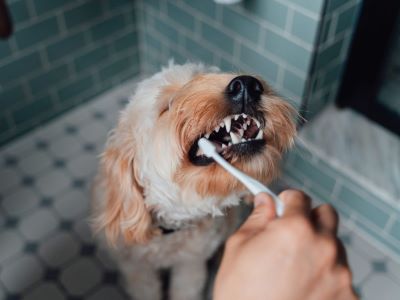
Alternate Day Brushing
Alternate day brushing is a more manageable option for dogs that may not tolerate daily brushing well or for owners with busy schedules.
- It’s particularly suitable for dogs with relatively healthy teeth and gums. While not as thorough as daily brushing, alternate day brushing still offers protection against plaque accumulation and dental issues.
- Some dogs may find daily brushing stressful, so alternating days can be a compromise that makes the process more enjoyable for both pet and owner.
- To compensate for less frequent brushing, consider providing dental chews or toys designed to promote oral health on non-brushing days.
Weekly Brushing
While weekly brushing is better than not brushing at all, it leaves more room for plaque build-up and dental issues to develop.
This may include dogs with an extremely low risk of dental problems, those with dietary or health restrictions that make daily brushing challenging, or senior dogs with extensive dental issues.
Factors That Influence the Frequency of Brushing
“To prevent serious dental disease, it is recommended to brush your pet’s teeth at home at least two to three times per week and take your pet for a professional dental cleaning once a year“, confirms the experts at PetMD.
Let’s delve into the factors that influence how often you should brush your dog’s teeth:
1. Size and Breed of The Dog
Understanding your dog’s breed-specific dental needs can help tailor your brushing routine accordingly.
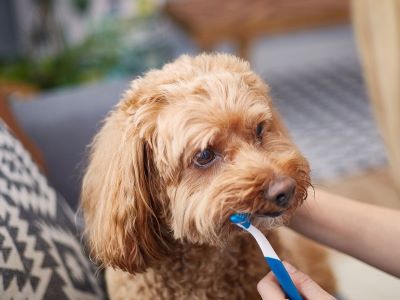
- Smaller dog breeds, such as Chihuahuas, Toy Poodles, and Dachshunds, tend to be more prone to dental problems. As a result, they often require more frequent brushing.
- Conversely, larger breeds, like Great Danes or Saint Bernards, may have relatively fewer dental issues and might not need daily brushing.
- Certain breeds are genetically predisposed to dental issues. For example, brachycephalic breeds (dogs with flat faces), like Bulldogs and Pugs, are more likely to have dental crowding, making them susceptible to dental problems.
Knowing details like how many teeth do dogs have for your dog’s specific breed can help tailor your brushing routine accordingly
2. Age of The Dog
Puppies, like human children, undergo teething. During this stage, they may be more prone to chewing and biting, which can help naturally clean their teeth. Periodontal disease is commonly seen in most pets by the age of three.
Older dogs might be less accepting of teeth brushing, so you may need to be more patient and creative in getting them accustomed to the process.
Senior dogs are more susceptible to dental issues like gum disease and tooth decay. Consequently, they often require more frequent dental care.
3. Diet and Chewing Habits
Dry kibble and dental-specific dog foods can help reduce plaque and tartar build-up compared to wet food.
- Dogs that primarily eat soft or moist diets may require more frequent teeth brushing to compensate for the lack of natural dental cleaning.
- Dogs that chew on appropriate items like dental chews, raw bones
, or chew toys can naturally help keep their teeth cleaner.
- If your dog has a robust chewing habit, you might be able to brush their teeth less frequently, depending on their breed and age. Regular brushing is still necessary to remove bacteria and food particles that can lead to dental problems.
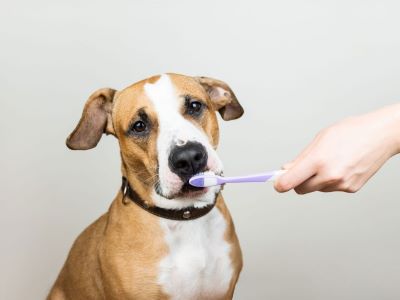
4. Existing Dental Health Issues
If your dog has a history of dental issues, such as gum disease, tooth decay, or extractions, they may require more frequent dental care.
Dogs undergoing dental treatments or surgeries may also need more intensive oral care, including frequent brushing, as part of their post-operative recovery and ongoing maintenance.
Signs of Dental Issues
Signs can vary depending on the underlying cause and individual circumstances. Here are some common signs of dental issues and what they may indicate:
| Signs of Dental Issues | Possible Causes |
|---|---|
| Bad Breath (Halitosis) | Cavities or Dry mouth |
| Red, Swollen, Tender, or Bleeding Gums | Gum disease |
| Excessive Drooling | Oral infections or Tooth pain |
| Sudden Changes in Eating Habits | Tooth decay or Tooth Sensitivity |
| Yellow or Discoloured Teeth | Poor oral hygiene, Staining from certain foods |
| Pawing at the Mouth | Dental pain or discomfort |
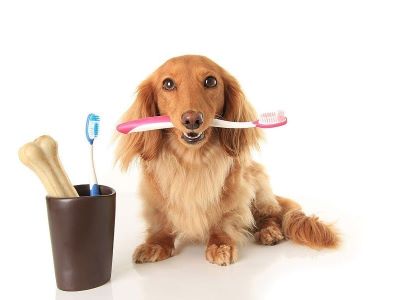
Plaque buildup can lead to some of these concerning signs. To learn how to remove plaque from dog teeth, check out our guide.
Dental Care Tips
Use dog toothpaste with flavours like poultry or beef that dogs enjoy. It’s safe to swallow and doesn’t foam, unlike human toothpaste. Dog toothbrushes are designed to fit a dog’s mouth, making teeth and gum cleaning more effective.
Familiarise your dog with brushing by letting them sniff and lick the toothbrush and toothpaste. Start with short brushing sessions and gradually increase the time as your dog gets used to it.
When brushing your dog’s teeth, use gentle motions and the best ultrasonic dog toothbrush you can find. Ultrasonic toothbrushes use vibration to help remove plaque and tartar buildup.
Positive reinforcement is important, reward your dog with treats
Patience is essential, as some dogs may take time to adjust to teeth brushing. Schedule regular dental check-ups with a vet to detect dental issues early, before they become severe and painful.
FAQs
 Is It Okay if I Don’t Brush My Dog’s Teeth?
Is It Okay if I Don’t Brush My Dog’s Teeth?
Without brushing, the particles adhere to the teeth. Bacteria then feed on these particles and produce tartar. This leads to dental disease, which causes bad breath, tooth loss, and pain.
 How Often Should You Brush Dog’s Teeth?
How Often Should You Brush Dog’s Teeth?
Like us, it is best to brush your dog’s teeth at least twice every day. For many dogs, once brushing becomes a part of their daily routine, they will begin to expect and enjoy it. Brushing three times a week is the minimum recommendation to help remove plaque and prevent tartar accumulation.
 What Is the Natural Toothpaste for Dog’s Teeth?
What Is the Natural Toothpaste for Dog’s Teeth?
It’s like a superhero for your dog’s teeth, fighting off bad bacteria and freshening breath all at once.” In a small bowl or cup, mix equal parts coconut oil and baking soda. Stir until a paste forms. Apply paste to toothbrush or gauze and clean gums and teeth gently.
Summary
In the search for “How often should you brush a dog’s teeth?” and maintaining our dog’s shiny smiles. The answer isn’t one-size-fits-all but rather a custom-made plan that suits each dog’s unique needs.
Ensuring that your dog enjoys the best dental care isn’t just about fresher breath and sparkling teeth; it’s about their overall health and well-being. It’s about being their guardian and ensuring they live a happy, healthy life.
So, get creative together as you embark on this dental journey with your loyal companion and you’ll have plenty of reasons to smile!
Reference:
- Brushing your dog’s teeth | VCA Animal Hospital | VCA Animal Hospitals. (n.d.). VCA.









